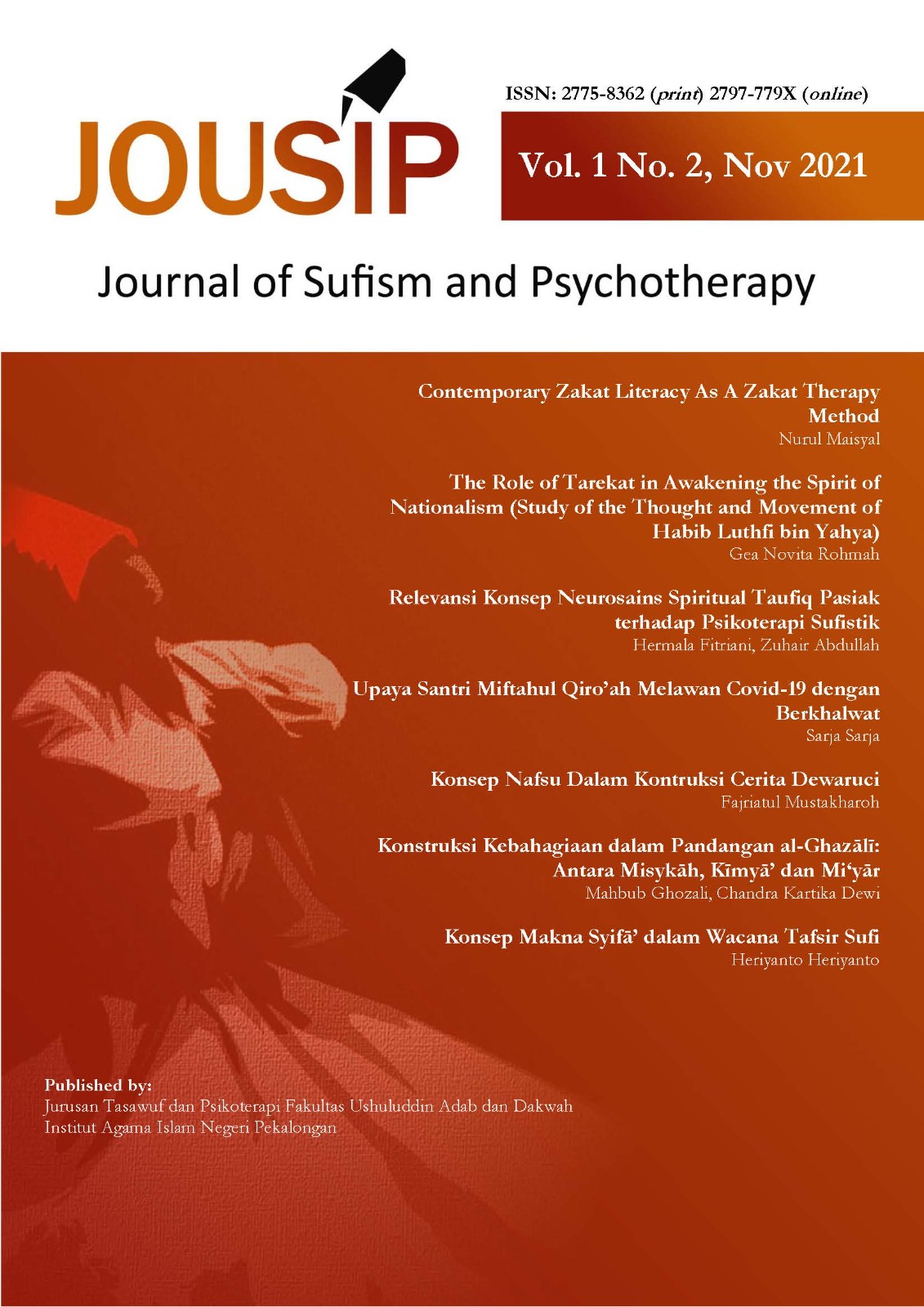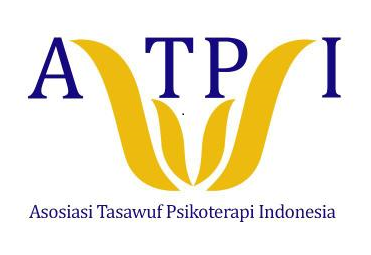Konsep Makna Syifā’ dalam Wacana Tafsir Sufi
DOI:
https://doi.org/10.28918/jousip.v1i2.4959Keywords:
Qur’anic Interpretation, Sufis Interpretation, Sufism, Syifā’Abstract
Qur'an uses the word al-Syifā' to refer the meaning of treatment, not using the term al-Ṭibb which is more synonymous with treatment based on instructions from the hadith. The Qur'an and the hadith basically have the same position in discussing treatment, namely both as a source of knowledge to treat various diseases, both physical and non-physical. This study will question the meaning of the Sufis on the concept of Shifā' in the Qur'an. The study will be directed to find out how the concept of the meaning of Syifā' is in Sufi interpretations. This research is part of library research whose data is taken from library sources. The data source used in this research is a list of authors of Sufi commentaries that have been clarified by Al-Zahabi in the book Tafsīr wa al-Mufassirūn. This study uses a thematic model approach by taking into account aspects of the meaning of Syifā' terminology in the Qur'an. The results show that in interpreting the word Syifā', the Sufis tend to prioritize the metaphysical aspects. Their interpretation of the meaning of Shifā' is converging on an understanding of spiritual dimension remedies whose orientation is to treat the human heart. Almost all of the verses that are interpreted are always associated with medicines that have an inner dimension, such as medicine to cleanse the soul of all the evil that surrounds it, such as, medicine for longing for Allah, for overcoming doubts, for being able to be tawadu' and to always closer to Allah.
References
AB, Z. (2011). Sejarah Perkembangan Tasawuf. Substantia: Jurnal Ilmu-Ilmu Ushuluddin, 13(2), 249–256.
Al-Banā, M. K. (2018). al-Ruqya al-Syar’iyyah wa al-Ṭāqah al-Syifā’iyyah Li Ilāj al-Hasad wa al-Sihr wa al-Mass. Dār ‘ālam al-Ṡaqāfah li al-Nasyr wa al-Tauzī.’
Al-Bāqi, M. F. A. (2006). Al-Mu’jām al-Mufahras Li AlFāẓ al-Qur’ān al-Karīm. Dār Kutub al-Miṣriyyah.
Al-Jauziyah, I. Q. (2012). Al-Ṭibb al-Nabawī. Maktabah Dār al-Salām.
Al-Kubrā, N. (2009). al-Ta’wīlāt al-Najmiyyah Fī al-Tafsīr al-Isyārī al-Ṣūfī. Dār Kutub al-Ilmiyyah.
Al-Marāghī, A. M. (1946). Tafsīr al-Marāghī. Maktabah wa Maṭba’ah Musṭafā Albab al-Halbā wa Aulādihī.
Al-Qal’ajī, A. al-M. A. (1986). Fatāwā wa Masā’il Ibnu Ṣalah Fī al-Tafsīr wa al-Ḥadiṡ wa al-Uṣūl wa al-Fiqh. Dār al-Ma’rifah.
Al-Rawi, S., & Fetters, M. D. (2012). Traditional Arabic & Islamic Medicine: A Conceptual Model for Clinicians and Researchers. Global Journal of Health Science, 4(3), 164–169.
Al-Shiddiqi, H. (2012). Ilmu-ilmu al-Qur`an. Pustaka Rizki Putra.
Al-Sinā, A. B. I. (2013). Al-Ṭibb al-Nabawī. Dār al-Risālah.
Al-Sulamī, A. A. al-R. M. (2001). Ḥaqāiq al-Tafsīr – Tafsīr al-Qur’ān al-‘Azīz. Dār Kutub al-Ilmiyyah.
Al-Suyūṭi, J. A. al-R. (1967). al-Itqān Fī ‘Ulūm al-Qur’ān. Maktabah wa al-Maṭba’ah al-Masyhad al-Husainī.
Al-Suyūṭi, J. A. al-R. (2002). Al-Ṭibb al-Nabawī. Mu’assasah al-Kutub al-Ṡaqāfiyah.
Al-Syirāzi, R. al-B. (2008). Tafsīr ‘Arā’is al-Bayān Fī Ḥaqāiq al-Qur’ān. Dār Kutub al-Ilmiyyah.
Al-Żahabi, M. H. (1978). Al-Ittijahāt al-Munharifah Fī Tafsīr al-Qur`ān al-Karīm: Dawāfi’uhā wa Daf’uhā. Dār al-I’tiṣām.
Al-Żahabi, M. H. (2000). Al-Tafsīr wa al-Mufassirūn. Maktabah Wahbah.
Al-Zarqāni, M. A. al-‘Aẓim. (1995). Manāhil al-‘Irfān fī ‘Ulūm al-Qur`ān. Dār al-Kitāb al-‘Izza.
Asman, O. (2008). Qur’anic Healing for Spiritual Ailments: Between Tradition, Religious Law and Contemporary Law. Medicine and Law, 27(2), 259–284.
Deuraseh, N. (2006). Health and Medicine in The Islamic Tradition Based on The Book of Medicine (Kitab Al-Tibb) of Sahih Al-Bukhari. Journal of International Society For The History of Islamic Medicine (JISHIM), 5(9), 2–14.
Ewing, K. (1984). The Sufi as Saint, Curer, and Exorcist in Modern Pakistan. In K. Ishwaran & B. L. Smith (Eds.), Contributions to Asian Studies (18th ed., pp. 106–114). E.J. Brill.
Fuadah, M. (2019). Konsep Syifa Dalam Perspektif Alquran (Studi Tafsir Al-Misbah Karya M. Quraish Shihab dan Tafsir Al-Marāghi Karya Ahmad Mustāfa Al-Marāghi). UIN Sultan Maulana Hasanuddin Banten.
Hoffer, C. B. . (1992). The Practice of Islamic Healing. In W. A. Shadid & P. S. van Koningsveld (Eds.), Islam in Dutch Society: Current Developments and Future Prospects. Kok Pharos Publishing House.
Ibrahim, M. A., Shah, A. S. M., & Mohd, R. A. (2017). Concept of Shifa’ in Al-Quran: Islamic Medicine Approach In Healing Physical Disorder. Al-Qanatir: International Journal of Islamic Studies, 6(2), 23–39.
Inayat, Q. (2005). Islam, Divinity, and Spiritual Healing. In M. Roy & W. West (Eds.), Integrating Traditional Healing Practices Into Counseling and Psychotherapy (pp. 159–168). SAGE Publication.
Ivanishkina, Y. V., Shmatova, M. B., & Goncharova, E. A. (2020). Sufi Healing in The Context of The Islamic Culture. European Journal of Science and Theology, 16(5), 99–106.
Jalal, A. (1990). Urgensi Tafsir Maudhu’i Pada Masa Kini. Kalam Mulia.
Karmi, G. (2002). Al-Tibb al-Nabawi: The Prophet’s Medicine. In R. Tapper & K. McLachlan (Eds.), Technology, Tradition and Survival: Aspects of Material Culture in the Middle East and Central Asia (pp. 51–63). Routledge.
Kaṡīr, I. bin U. bin. (2000). Tafsīr al-Qur’ān al-Ażim. Dār Ibnu Hazm.
Kemenag RI. (2021). Surat al-Taubah. Quran.Kemenag.Go.Id. https://quran.kemenag.go.id/sura/9/14
Khainuddin. (2019). As-Shifa Perspektif Tafsir al-Ibris Karya Bisri Mustofa. Tribakti: Jurnal Pemikiran Keislaman, 30(1), 218–240.
Manżūr, I. (2008). Lisān al-‘Arab. Dār al-Ma’ārif.
Mitha, K. (2018). Sufism and Healing. Journal of Spirituality in Mental Health, 21(3), 194–205.
Muhammed, Q. A. (2014). Al-Tafsīr al-Isyārī Baina al-Rau’ah wa al-Bid’ah. Journal of Divinity Faculty of Hitit University, 13(25), 93–123.
Putra, D. A. (2018). Epistemologi Tafsir Sufi Perspektif Esoterik-Fenomenologi. Ulul Albab, 19(2), 185–208.
Ṣāliḥ, Ṣubḥī. (1977). Mabāhiṡ fī ‘Ulūm al-Qur`ān. Dār al-‘Ilm Li al-Malāyin.
Sands, K. Z. (2006). Sufi Commentaries on The Qur’an in Classical Islam. Routledge.
Siswanti, G. N. (2019). Eksistensi dan Konsep Syifa’ dalam Tafsir Fakhrudin Al-Razi. Al-Mada: Jurnal Agama, Sosial, Dan Budaya, 2(2), 1–16.
Downloads
Published
Issue
Section
License
Copyright (c) 2021 Heriyanto Heriyanto

This work is licensed under a Creative Commons Attribution-ShareAlike 4.0 International License.

















